Private, Public and Global Enterprises Chapter Notes | Business Studies (BST) Class 11 - Commerce PDF Download
Introduction
- There are many types of business organisations in daily life, such as sole proprietorships, retail companies, partnerships, joint Hindu families, cooperatives, and government-owned entities.
- Private organisations, like local shops and service providers, are common in neighbourhoods.
- Government-owned entities, such as the Railways and the Post Office, also exist. The post office in your area is operated by the Post and Telegraph Department, Government of India, although our reliance on their services, especially in cities and towns, has significantly decreased.
- Global enterprises operate across multiple countries.
- The public sector includes various organisations that are owned and managed by the government, such as departmental enterprises, statutory corporations, and government companies.
- The evolving role of the public sector shows the need for efficiency and modernisation to meet economic challenges.
- Joint ventures are helpful because they allow companies to share resources, risks, and expertise, making it easier to enter new markets.

Private Sector and Public Sector
- The private sector consists of businesses owned by individuals or groups, as discussed in the previous chapter.
- The different types of organisations include sole proprietorships, partnerships, joint Hindu families, cooperatives, and companies.
- The public sector comprises various organisations owned and managed by the government, which includes departmental enterprises, statutory corporations, and government companies.
- The changing role of the public sector indicates the need for greater efficiency and modernisation in response to economic challenges.

The 1948 Industrial Policy Resolution
- The 1958 Industrial Policy and Resolution outlined the roles of the private and public sectors and established government oversight.
- The 1956 Industrial Policy Resolution aimed to boost growth and industrialisation in the public sector, highlighting the interdependence of both sectors.
- The 1991 industrial policy allowed for disinvestment in the public sector, increased freedom for the private sector and encouraged foreign direct investment.
- This policy enabled multinational corporations to enter the Indian market.
- The Indian economy is a mixed economy that includes public sector units, private sector enterprises, and global businesses.
- Global enterprises operate across multiple countries, which contributes to the classification of economic sectors.

Forms of Organising Public Sector Enterprises
- The government requires an organisational framework to engage in business and economic activities.
- In the private sector, business forms include sole proprietorship, partnership, Hindu undivided family, cooperative, and company.
- The government creates public enterprises in the public sector to engage in economic activities.
- These public enterprises are owned by the public and are responsible to the public through Parliament.
- They are marked by public ownership, use of public funds, and accountability to the public.
- Public enterprises are expected to aid in the country’s economic development in a competitive, liberalised environment.
- The form of a public enterprise depends on its operations and its relationship with the government.
- Any public sector organisation should focus on performance, productivity, and quality standards.
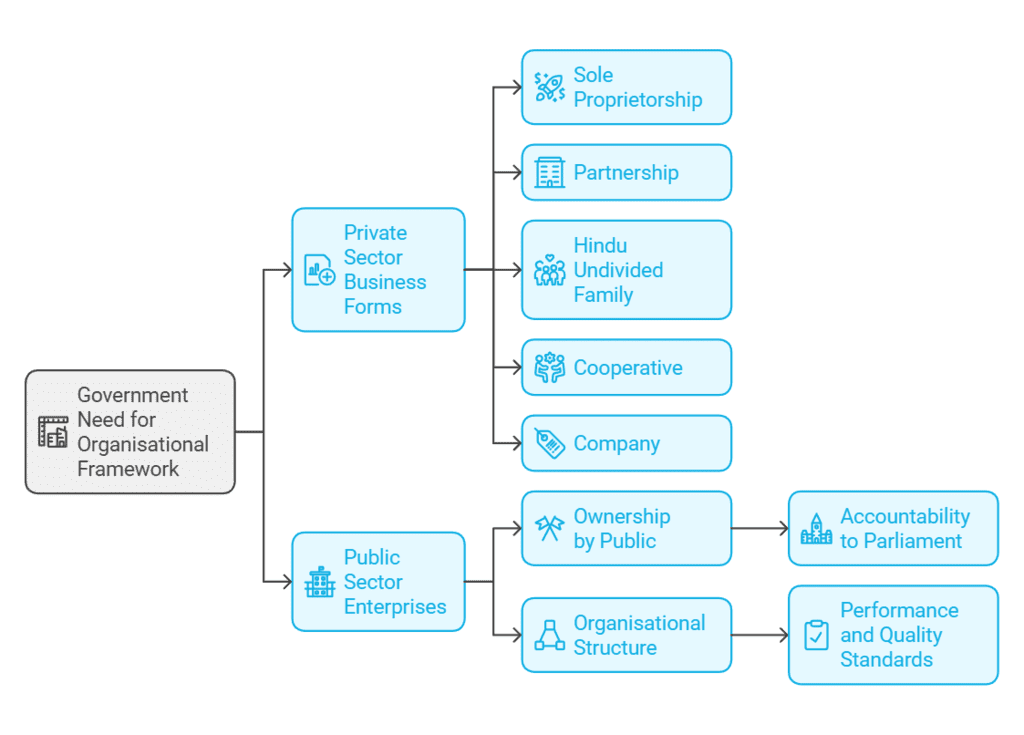
Public Sector
- Departmental Undertakings
- Statutory Corporations
- Government Companies
1. Departmental Undertakings
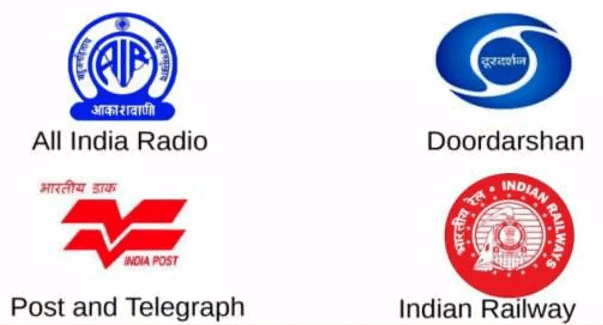
- Departmental undertakings are not separate legal entities; they are part of the ministry itself and are not independent bodies.
- These operations function as ministry departments and are seen as extensions of the ministry.
- They run with government personnel, meaning their staff are government employees.
- These activities may be regulated by the federal or state governments, which means their operations follow federal or state rules.
- They are led by Indian Administrative Service (IAS) officers and civil servants who can be transferred between ministries.
- Railways and the Post and Telegraph Department serve as examples of such operations.

Features
- The funding for these enterprises comes directly from the Government Treasury, based on an annual budget allocation. Any revenue generated is also deposited into the treasury.
- They must adhere to accounting and audit standards that apply to other government functions.
- Employees in these enterprises are considered Government servants, with recruitment and working conditions similar to those of other government employees.
- These undertakings are typically seen as major subdivisions of a government department and are directly supervised by the ministry.
- They have some independence in their operations and enjoy a considerable degree of operational flexibility.
- Accountability to the ministry is required since their management falls under the relevant ministry's control.
Merits
- These undertakings allow Parliament to maintain effective oversight of their operations.
- They ensure a significant level of public accountability.
- Revenue generated by these enterprises goes directly to the treasury, making it a source of income for the Government.
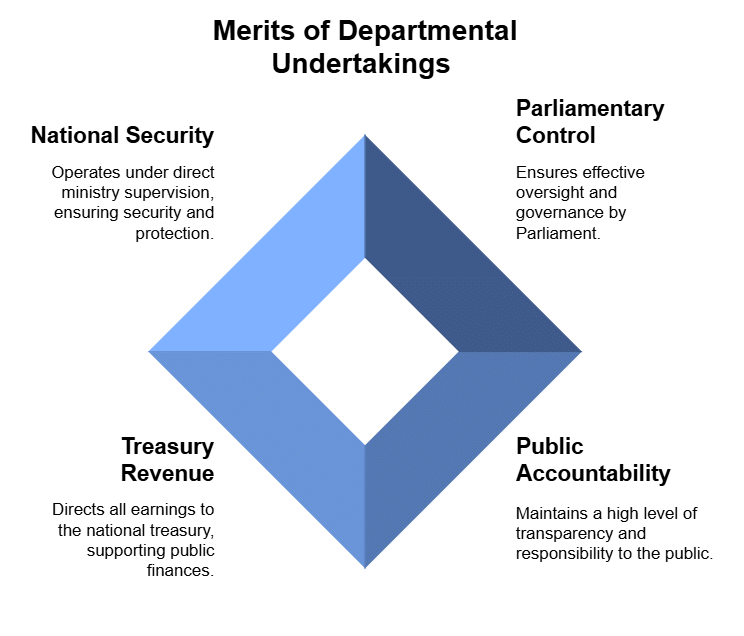
Limitations
- Departmental undertakings often lack the flexibility needed for smooth business operations.
- Employees or heads of departments cannot make independent decisions without ministry approval, causing delays in urgent situations.
- Bureaucratic caution can prevent officials from pursuing innovative or risky initiatives.
- No actions can be taken until the appropriate channels of authority are followed.
- These organisations often do not respond well to consumer needs, resulting in inadequate services.
2. Statutory Corporations
- Statutory corporations are public enterprises created by a Special Act of Parliament.
- The Act specifies their powers and functions, along with the rules governing their staff and interactions with government bodies.
- They possess government authority and significant flexibility similar to private companies.
- These organisations are established under a parliamentary act and are regulated by its provisions.
- Statutory corporations are entirely owned by the state.
- The government holds the final financial responsibility and can use their profits.
- They are legal entities, capable of suing, being sued, entering contracts, and owning property.
- They acquire funds by borrowing from the government or the public.
- The employment terms of staff are outlined by the act.
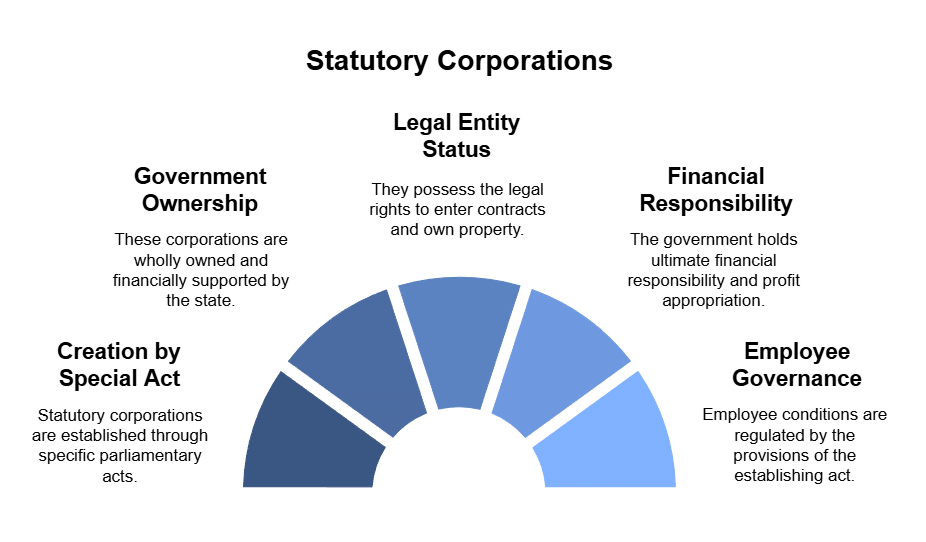
Merits
- They enjoy independence in their functioning and a high degree of operational flexibility.
- The government does not interfere in their financial matters, including income and receipts.
- Within the powers granted to them by the legislation, they create their own policies and procedures.
- It is a valuable instrument for economic development.
Limitations
- Every action is governed by a set of rules and regulations. Hence operational flexibility isn’t much possible.
- In big choices or where large sums of money are involved, government and political intervention has always been present.
- Corruption is pervasive everywhere there is public interaction.
- Appointing Advisors to the Corporation Board limits the corporation's ability to enter into contracts and make other decisions.
3. Government Company
- A government company, as defined by section 2(45) of the Companies Act 2013, is a company where at least 51 percent of the paid-up capital is owned by the central government, a state government, or both. This includes any subsidiaries of such a company.
- There are specific restrictions on the appointment and retirement of directors and other key management personnel.
- The shares of the company are held in the name of the President of India.
- A government company operates as a separate legal entity, distinct from the government.
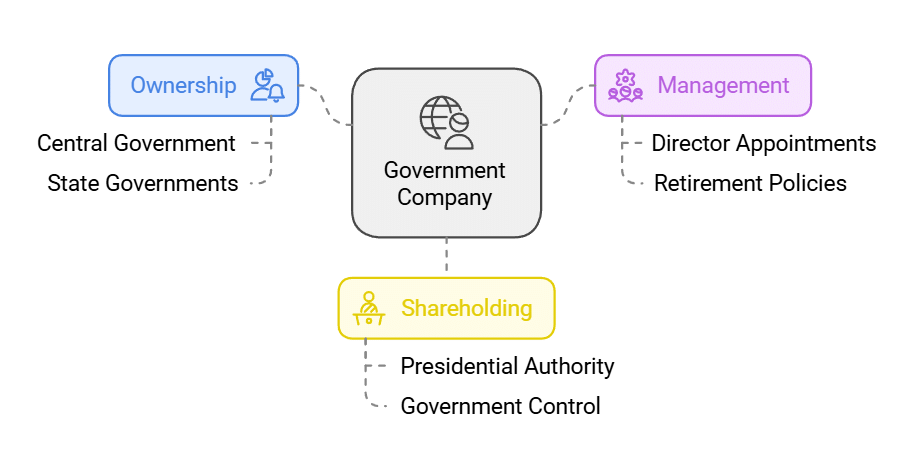
- The company is established under the Companies Act of 2013 or any earlier company law.
- Individuals can take legal action against the company, and it can also sue others.
- The company can enter into contracts and acquire property in its own name.
- Management is governed by the rules of the Companies Act, similar to any public limited company.
- Employees are appointed based on the rules outlined in the Memorandum and Articles of Association.
- These companies are exempt from certain accounting and audit regulations. An auditor is appointed by the Central Government, and the Annual Report must be presented to Parliament or the State Legislature.
- Funding comes from government shareholdings and private investors, and they can also raise money in the capital market.
Merits
- The Indian Companies Act specifies the prerequisites for forming a government business.
- Apart from the government, it has its legal entity.
- It has complete autonomy over all management choices and takes measures based on sound business judgment.
- Companies can control the market and discourage unhealthy business practices by supplying goods and services at appropriate pricing.
Limitations
- Because the government is the sole stakeholder in some of the enterprises, the Companies Act's restrictions are largely irrelevant.
- It avoids the constitutional duty that a government-funded enterprise should have.
- The government is in charge of management and administration. The main purpose of the government company, registered like other companies, is defeated.
Changing Role of the Public Sector
Initially, public sector enterprises were expected to significantly contribute to economic goals at the time of Independence. They were meant to create necessary infrastructure and invest in crucial areas, especially since the private sector was hesitant to do so. However, after the 1990s, new economic strategies emphasised liberalisation, privatisation, and globalisation. This led to a redefined role for the public sector; it was required to actively participate and compete with private sector companies in the market. Public sector enterprises became accountable for their losses and return on investment. If a public sector unit consistently incurred losses, it was referred to the Board for Industrial and Financial Reconstruction (BIFR) for complete restructuring or closure. Efforts were made to study inefficient public sector units and enhance their management efficiency and profitability. The role of the public sector has changed significantly since its beginning.
1. Development of Infrastructure
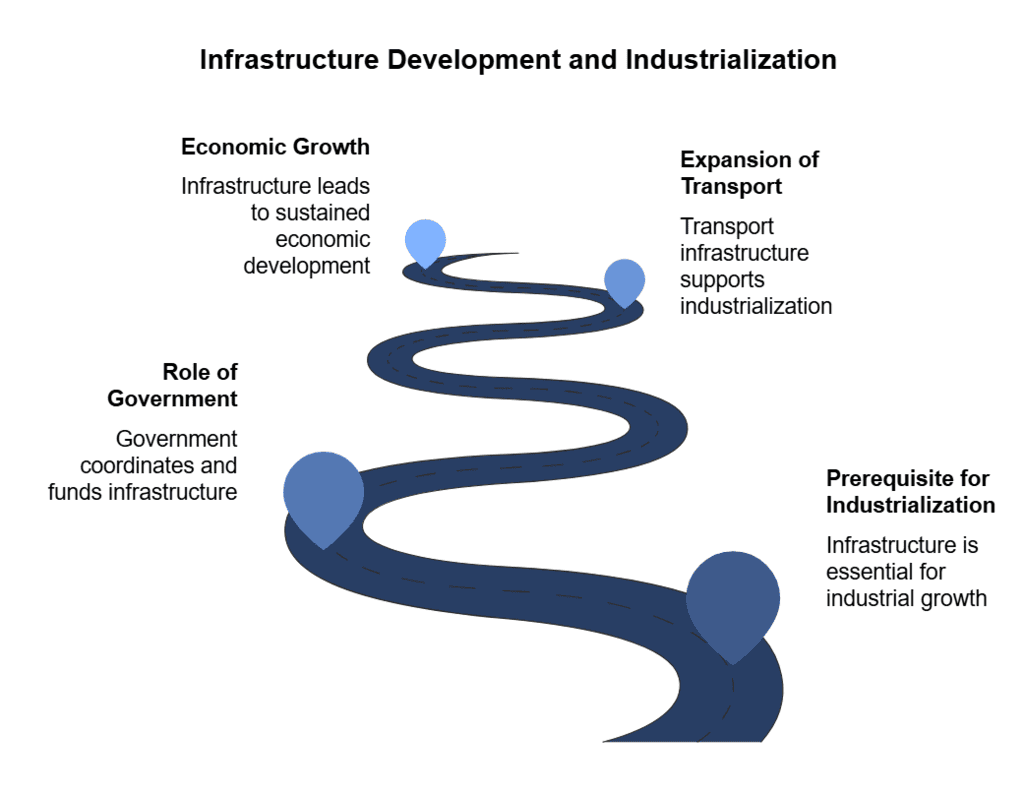
- The development of infrastructure is essential for a country’s industrialisation.
- Industrialisation cannot be sustained without sufficient transport, communication, fuel, energy, and basic and heavy industries.
- Only the government can mobilise substantial capital, coordinate industrial construction, and train the necessary workforce.
- Public sector enterprises were vital in establishing heavy engineering capabilities, which helped reduce imports during the second and third Five Year Plans.
2. Regional Balance
- The government is responsible for ensuring balanced development across all regions and eliminating regional inequalities.
- Public sector industries were intentionally set up in less developed areas to stimulate economic growth, create jobs, and encourage supporting industries.
- Four major steel plants were constructed in underdeveloped areas to boost economic progress.
3. Economies of Scale
- Large-scale enterprises require significant capital investment, prompting government involvement to realise economies of scale.
- Industries such as electricity, power, natural gas, petroleum, and telecommunications needed a large base to operate economically, which was achievable only through government resources and mass production.
4. Check Over-Concentration of Economic Power
- New private-sector industrial groups should be ready to invest in heavy sectors to prevent wealth from concentrating in a few hands.
- The public sector can establish large industries that require considerable investment.
- This helps prevent the accumulation of wealth and economic power within the private sector.
In summary, the public sector has undergone significant changes since its inception, adapting to the economic landscape of India and addressing the challenges of industrialisation, regional balance, and economic power distribution.
5. Import Substitution
- During the second and third Five Year Plan periods, India aimed to be self-reliant in many areas. A key issue was obtaining foreign exchange, which made it tough to import the heavy machinery needed for a robust industrial base.
- The government set up public sector companies in heavy engineering to support import substitution.
- Several public sector enterprises, like STC and MMTC, have significantly contributed to boosting the country's exports.
6. Government Policy Towards Public Sector Since 1991
- In 1991, the government launched four key reforms in the public sector as part of its new industrial policy:
- Restructure and revive potentially viable PSUs, close down those that cannot be revived, reduce government share in all non-strategic PSUs to 26 percent or lower if needed, and ensure the interests of workers are fully protected.
- In the 1956 resolution on industrial policy, 17 industries were reserved for the public sector. By 1991, only 8 industries were reserved, limited to atomic energy, arms, communication, mining, and railways. In 2001, only three industries remained under exclusive public sector reservation: atomic energy, arms, and rail transport.
- The process of selling equity shares to the private sector and the general public is known as disinvestment. This aimed to raise funds and encourage more public and worker involvement in ownership.
- All public sector units were referred to the Board of Industrial and Financial Reconstruction to decide whether a struggling unit should be revived or shut down. In some cases, the board has revisited revival and rehabilitation plans, as well as closure for several units.
Global Enterprises
- Global enterprises are large industrial groups that expand their manufacturing and marketing operations in various countries through subsidiaries.
- Majority Owned Foreign Affiliates (MOFA) is another term for their branches.
- They do not focus solely on making profits from a few products but rather establish their presence widely.
- Thanks to their financial resources, advanced technology, and reputation, they can influence the global economy significantly.

Features
1. Huge Capital Resources
- They have significant financial resources and can obtain funds from various sources.
- They may issue equity shares, debentures, or bonds to the public.
- They can also borrow money from banks and financial institutions worldwide.
2. Foreign Collaboration
- They establish agreements with local companies for technology transfer, manufacturing products, and using brand names.
- They may collaborate with both government and private sector entities.
- These agreements often include restrictions on technology transfer, pricing, dividends, and control by foreign experts.
3. Advanced Technology
- These companies benefit from technological advancements in their production processes.
- They comply with international quality standards and specifications.
- This leads to industrial growth in the countries where they operate, as they maximise local resources and materials.
4. Product Innovation
- These businesses feature advanced research and development teams focused on creating new products and improving existing ones. This type of research demands a large investment, which only global companies can manage.
- These companies have superior technology in their production processes and can meet international quality standards.
5. Marketing Strategies
- They use aggressive marketing techniques to increase sales quickly.
- They have a more reliable and current market information system.
- Having established a strong presence in the global market, their well-known brands make selling products easier.
6. Expansion of Market Territory
- Their operations reach beyond their own countries.
- Their international reputation grows, expanding their market area and establishing them as global brands.
- They operate in other countries through subsidiaries, branches, and affiliates, allowing them to dominate the market.
7. Centralised Control
- Their headquarters are located in their home country, giving them full control over all branches and subsidiaries.
- This control is maintained within the broad policies set by the parent company.
8. Foreign Collaboration
- Global companies often form agreements with local businesses for technology sales, product manufacturing, and brand name usage for their final products.
9. Huge Capital Resources
- These companies are known for having significant financial resources and can obtain funds from various sources, including issuing shares, debentures, or bonds, and borrowing from banks and financial institutions.
Joint Ventures
- A joint venture can mean different things based on the context. Generally, it involves two or more businesses combining their resources and expertise to achieve a specific goal while sharing both the risks and rewards.
- The joint venture agreement should specify that all necessary government approvals and licenses will be obtained within a set time frame.
- This agreement must be based on a memorandum of understanding signed by both parties, detailing the terms of the arrangement.
- Common reasons for forming a joint venture include business growth, developing new products, or entering new markets, especially in other countries. In India, there are no distinct laws for joint ventures; companies incorporated there are treated similarly to domestic ones.
Joint Venture - Types
A. Equity-Based Joint Venture
- This type of joint venture involves two or more parties creating a separate business entity that is co-owned.
- The forms of business entities can vary.
B. Contractual Joint Venture
- In a contractual joint venture, no new entity is formed. Instead, there is simply an agreement to collaborate. The parties do not share ownership but maintain some control over the joint effort.
- Each party contributes resources, and shared management is arranged.
Features of Joint Ventures
- Joint ventures feature significant capital resources, foreign collaboration, advanced technology, product innovation, marketing strategies, market territory expansion, and centralised control.
Benefits
- Working together allows the joint venture to enhance its resources and capabilities, promoting faster and more efficient growth.
- When partnering with a foreign company, a business gains access to a large and rapidly growing market.
- Access to advanced technology means that companies can utilise innovative manufacturing processes, resulting in higher-quality products and saving time, energy, and money without needing to develop their own technology.
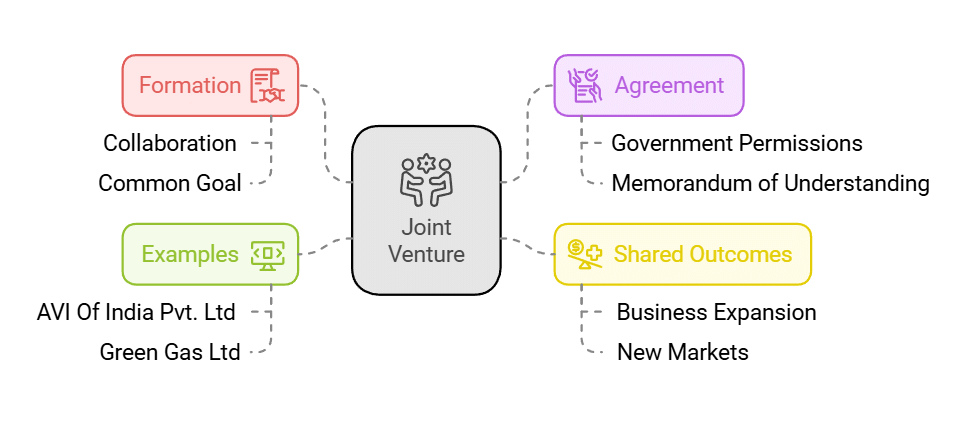
Public Private Partnership
A public-private partnership (PPP) is a cooperative arrangement between public and private organisations for infrastructure and various services.
Features
- The public partners in a PPP are government bodies, such as ministries, government departments, local councils, or state-owned companies. The private partners can be domestic or international businesses that provide relevant technical or financial expertise.
- The government's involvement in PPPs includes not only a commitment to social responsibility and environmental sustainability but also financial support and the transfer of assets that help the partnership.
- The private sector contributes by using its expertise in operations, management, and innovation to run projects effectively.
- NGOs and community organisations are also involved as stakeholders who are directly impacted by the project.
PPPs have been successfully implemented in various sectors globally, including power generation, water treatment, waste management, pipelines, hospitals, schools, stadiums, air traffic control, prisons, railways, roads, IT systems, and housing.
Merits
- Shifts the risk of design and construction.
- Can speed up project completion.
Weaknesses
- Conflicts may occur regarding environmental issues.
- It is often challenging to attract private investment.
HOTS
1. Can the public sector companies compete with the private sector in terms of profit & loss efficiency? Give reasons for your answer.
Ans. No, public sector companies cannot compete with the private sector in terms of profit and efficiency. The reasons are:
- Public sector enterprises (PSEs) are government-owned, focusing on social services rather than profit. Their goal is to achieve social aims like developing backward areas and creating jobs.
- Public sector enterprises are influenced by government policies, limiting their autonomy and flexibility.
- Management is often poor and inefficient due to bureaucratic control, as they are led by bureaucrats instead of professionals.
2. Public sector enterprises have played a vital role in the economic development of India. However, the Government of India vigorously pursues the policy of disinvestment of such units. What is the rationale for disinvestment at this time?
Ans. Public sector enterprises have significantly contributed to India’s economic development by:
- Filling industrial gaps,
- Creating jobs,
- Promoting regional balance,
- Preventing the concentration of economic power.
Despite their positive impact, they have faced issues like:
- High overhead costs,
- Low production capacity utilisation,
- Inefficient management,
- Low returns or losses.
Thus, the Government of India is disinvesting in poorly performing PSUs by selling shares to the private sector and the public to reduce government ownership.
3. State any three situations wherein a Government Company is the most suitable form of organizing public enterprises.
Ans. A Government Company is ideal in these situations:
- When the government wants to control a private sector company without nationalisation during financial or employment crises.
- When the government needs to promote an area of economic activity.
- When the government aims to start a venture with private interests, whether local or international.
4. What motivates a company to go global?
Ans. The primary motivation for a company to go global is to expand its business. A larger market across various countries allows for:
- Increased profits,
- Reduced costs through large-scale production.
5. Why are global enterprises considered superior to other business organizations?
Ans. Global enterprises are viewed as superior because they can:
- Take advantage of economies of scale,
- Access bigger markets,
- Enhance competitiveness,
- Optimise resources and innovate more effectively, leading to better profitability and sustainability.
6. What are the benefits of entering into joint ventures and public-private partnerships?
Ans. The benefits include:
- Shared risks and costs,
- Access to new markets and technologies,
- Enhanced expertise,
- Improved efficiency in project execution.
These collaborations can provide better service delivery and foster innovation in public services.
|
38 videos|180 docs|28 tests
|
FAQs on Private, Public and Global Enterprises Chapter Notes - Business Studies (BST) Class 11 - Commerce
| 1. What are the main differences between public and private sector enterprises? |  |
| 2. What are the various forms of organizing public sector enterprises? |  |
| 3. How has the role of the public sector changed over the years? |  |
| 4. What are joint ventures and how do they benefit enterprises? |  |
| 5. What is the concept of Public Private Partnership (PPP) and its significance? |  |






















